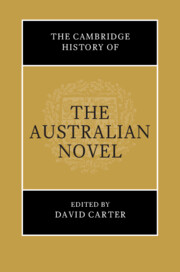Book contents
- The Cambridge History of the Australian Novel
- The Cambridge History of the Australian Novel
- Copyright page
- Contents
- Figures
- Contributors
- Acknowledgements
- Introduction
- 1 The Global Invention of the Australian Novel
- 2 Colonial Adventure Novels
- 3 Beyond Britain and the Book
- 4 Transnational Optics
- 5 The Novel in the Late Colonial Period
- 6 Love Is Not Enough
- 7 The Australian Crime Novel, 1830–1950
- 8 The Novel Nation
- 9 Selling Australian Stories to the World
- 10 Women Writers and the Emerging Urban Novel, 1930–1952
- 11 The National Trilogy and Mining
- 12 Nation and Environment in the Twentieth-Century Novel
- 13 Henry Handel Richardson, Christina Stead and the Transnational Fiction of Provincial Development
- 14 The Mid-Century Australian Novel and the End of World History
- 15 Race, Romance and Anxiety
- 16 Whiteness, Aboriginality and Representation in the Twentieth-Century Australian Novel
- 17 When the Twain Meet
- 18 From Bunyip to Boom
- 19 Unsettling Archive
- 20 The Novel at Arms
- 21 ‘Our Least-Known Best Seller’
- 22 Writing, Women and the Australian Novel
- 23 White Lies
- 24 The Economics of the Literary Novel
- 25 Mabo, History, Sovereignty
- 26 Indigenous Futurism
- 27 The Regional Novel in Australia
- 28 Children’s and Young Adult Literature
- 29 Grunge, Nation and Literary Generations
- 30 The Making of the Asian Australian Novel
- 31 Screening the Australian Novel, 1971–2020
- 32 Australian Fantasy, Crime and Romance Fiction in the Twentieth and Twenty-First Centuries
- 33 Uncertain Futures
- 34 A (Sovereign) Body of Work
- 35 The Novel Road to the Global South
- 36 The Fortunes of the Miles Franklin
- 37 The Arab Australian Novel
- 38 Riddling the Nation
- 39 Migrant Writing and the Invention of Australia
- Selective Bibliography: Studies of the Australian Novel, 2000–2021
- Index
36 - The Fortunes of the Miles Franklin
Australian Life in All Its Phases
Published online by Cambridge University Press: 28 June 2023
- The Cambridge History of the Australian Novel
- The Cambridge History of the Australian Novel
- Copyright page
- Contents
- Figures
- Contributors
- Acknowledgements
- Introduction
- 1 The Global Invention of the Australian Novel
- 2 Colonial Adventure Novels
- 3 Beyond Britain and the Book
- 4 Transnational Optics
- 5 The Novel in the Late Colonial Period
- 6 Love Is Not Enough
- 7 The Australian Crime Novel, 1830–1950
- 8 The Novel Nation
- 9 Selling Australian Stories to the World
- 10 Women Writers and the Emerging Urban Novel, 1930–1952
- 11 The National Trilogy and Mining
- 12 Nation and Environment in the Twentieth-Century Novel
- 13 Henry Handel Richardson, Christina Stead and the Transnational Fiction of Provincial Development
- 14 The Mid-Century Australian Novel and the End of World History
- 15 Race, Romance and Anxiety
- 16 Whiteness, Aboriginality and Representation in the Twentieth-Century Australian Novel
- 17 When the Twain Meet
- 18 From Bunyip to Boom
- 19 Unsettling Archive
- 20 The Novel at Arms
- 21 ‘Our Least-Known Best Seller’
- 22 Writing, Women and the Australian Novel
- 23 White Lies
- 24 The Economics of the Literary Novel
- 25 Mabo, History, Sovereignty
- 26 Indigenous Futurism
- 27 The Regional Novel in Australia
- 28 Children’s and Young Adult Literature
- 29 Grunge, Nation and Literary Generations
- 30 The Making of the Asian Australian Novel
- 31 Screening the Australian Novel, 1971–2020
- 32 Australian Fantasy, Crime and Romance Fiction in the Twentieth and Twenty-First Centuries
- 33 Uncertain Futures
- 34 A (Sovereign) Body of Work
- 35 The Novel Road to the Global South
- 36 The Fortunes of the Miles Franklin
- 37 The Arab Australian Novel
- 38 Riddling the Nation
- 39 Migrant Writing and the Invention of Australia
- Selective Bibliography: Studies of the Australian Novel, 2000–2021
- Index
Summary
The Miles Franklin Literary Award has traditionally been Australia’s most prestigious prize. In the past generation, though, it had been challenged by newer awards with different rubrics, such as the Prime Minister’s Award and the Melbourne Prize; prizes of a fundamentally different nature, such as the Patrick White Literary Award given to underrated senior writers; and international awards such as the Booker and the Nobel for which Australians have become increasingly viable candidates. In response, the Miles Franklin broadened its formerly nationalist criteria and became more open to Indigenous, female and younger writers. This chapter discusses the significance of the award in the global publishing market of the twenty-first century, focusing both on how it spotlighted important writers and also made those quirky literary judgements which make literary prizes interesting.
Keywords
- Type
- Chapter
- Information
- The Cambridge History of the Australian Novel , pp. 612 - 628Publisher: Cambridge University PressPrint publication year: 2023

